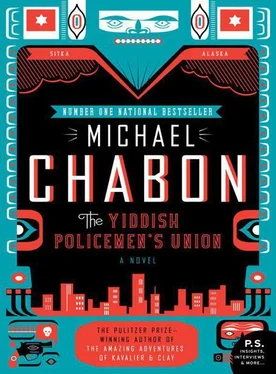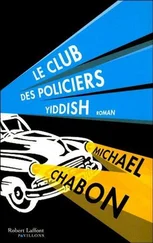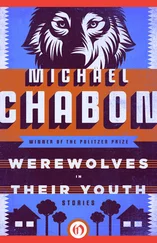Michael Chabon - The Yiddish Policemen's union
Здесь есть возможность читать онлайн «Michael Chabon - The Yiddish Policemen's union» — ознакомительный отрывок электронной книги совершенно бесплатно, а после прочтения отрывка купить полную версию. В некоторых случаях можно слушать аудио, скачать через торрент в формате fb2 и присутствует краткое содержание. Жанр: Альтернативная история, Полицейский детектив, на английском языке. Описание произведения, (предисловие) а так же отзывы посетителей доступны на портале библиотеки ЛибКат.
- Название:The Yiddish Policemen's union
- Автор:
- Жанр:
- Год:неизвестен
- ISBN:нет данных
- Рейтинг книги:5 / 5. Голосов: 1
-
Избранное:Добавить в избранное
- Отзывы:
-
Ваша оценка:
- 100
- 1
- 2
- 3
- 4
- 5
The Yiddish Policemen's union: краткое содержание, описание и аннотация
Предлагаем к чтению аннотацию, описание, краткое содержание или предисловие (зависит от того, что написал сам автор книги «The Yiddish Policemen's union»). Если вы не нашли необходимую информацию о книге — напишите в комментариях, мы постараемся отыскать её.
The Yiddish Policemen's union — читать онлайн ознакомительный отрывок
Ниже представлен текст книги, разбитый по страницам. Система сохранения места последней прочитанной страницы, позволяет с удобством читать онлайн бесплатно книгу «The Yiddish Policemen's union», без необходимости каждый раз заново искать на чём Вы остановились. Поставьте закладку, и сможете в любой момент перейти на страницу, на которой закончили чтение.
Интервал:
Закладка:
Landsman crumples the twenty and drops it into his hip pocket. He grinds his papiros under his shoe and goes into the hotel.
“Who’s the nut?” Netsky says.
“They call him Elijah. He’s harmless,” says Tenenboym from behind the steel mesh of the reception window. “You used to see him around sometimes. Always pimping for Messiah.” Tenenboym clacks a gold toothpick against his molars. “Listen, Detective, I’m not supposed to say anything. But I might as well tell you. Management is sending out a letter tomorrow.”
“I can’t wait to hear this,” Landsman says.
“The owners sold out to a Kansas City concern.”
“They’re tossing us.”
“Maybe,” Tenenboym says. “Maybe not. Nobody’s status is clear. But it’s not out of the question that you might have to move out.”
“Is that what it’s going to say in the letter?”
Tenenboym shrugs. “The letter’s all written in lawyer.”
Landsman puts Netsky the latke on the front door. “Don’t tell them what they heard or saw,” he reminds him. “And don’t give them a hard time, even if they look like they could use one.”
Menashe Shpringer, the criminalist working the graveyard shift, blows into the lobby in a black coat and fur hat, with a rattling of rain. In one hand Shpringer carries a dripping umbrella. With the other he tows a chrome caddy to which his black vinyl toolbox and a plastic bin, with holes for handles, are strapped with bungee cord. Shpringer is a fireplug, his bowed legs and simian arms affixed to his neck without apparent benefit of shoulders. His face is mostly jowl and his ridged forehead looks like one of those domed beehives you see representing Industry in medieval woodcuts. The bin is blazoned with the single word EVIDENCE in blue letters.
“Are you leaving town?” Shpringer says. It’s not an uncommon greeting these days. A lot of people have left town in the past couple of years, fled the District for the short roster of places that will welcome them, or that have tired of hearing about pogroms secondhand and are hoping to throw one for themselves. Landsman says that as far as he knows, he is not going anywhere. Most of the places that will take Jews require that you have a near relative living there. All of Landsman’s nearest relatives are dead or facing Reversion themselves.
“Then let me say goodbye to you now, forever,” Shpringer says. “Tomorrow night at this time I will be basking in the warm Saskatchewan sun.”
“Saskatoon?” Landsman guesses.
“Thirty below they had today,” Shpringer says. “That was the high.”
“Look at it this way,” Landsman says. “You could be living in this dump.”
“The Zamenhof.” In his memory, Shpringer pulls Landsman’s file, and frowns at its contents. “That’s right. Home sweet home, eh?”
“It suits me in my current style of life.”
Shpringer smiles a thin smile from which almost every trace of pity has been erased.
“Which way to the dead man?” he says.
4
First thing Shpringer screws in all the lightbulbs that Lasker loosened. Then he lowers his safety glasses and goes to work. He gives Lasker a manicure and pedicure and looks inside his mouth for a severed finger or a bronze doubloon. He lifts prints with his dust and brush. He takes 317 Polaroids. He takes pictures of the corpse, the room, the perforated pillow, the fingerprints he has raised. He takes a picture of the chessboard.
“One for me,” Landsman says.
Shpringer snaps a second shot of the board that the murder obliged Lasker to abandon. Then he hands it to Landsman, an eyebrow raised.
“Valuable clue,” Landsman says.
One piece at a time, Shpringer undoes the dead man’s Nimzo-Croatian Defense or whatever it is he had going, zipping each chessman into its own baggie.
“How’d you get so dirty?” he says without looking at Landsman.
Landsman notices the bright brown dust clinging to his shoe tops, his cuffs, the knees of his pants. “I was looking in the basement. There’s a huge, I don’t know, service pipe down there.” He feels the blood flow into his cheeks. “I had to check it out.”
“A Warsaw tunnel,” Shpringer says. “They go all through this part of the Untershtot.”
“You don’t believe that.”
“When the greeners got here after the war. The ones who had been in the ghetto at Warsaw. At Bialystok. The ex-partisans. I guess some of them didn’t trust the Americans very much. So they dug tunnels. Just in case they had to fight again. That’s the real reason it’s called the Untershtot.”
“A rumor, Shpringer. An urban myth. It’s just a utility pipe.”
Shpringer grunts. He bags the bath towel, the hand towel, and a worn tile of soap. He counts the ginger pubic hairs pasted to the toilet seat and then bags each one. “Speaking of rumors,” he says, “what do you hear from Felsenfeld?”
Felsenfeld is Inspector Felsenfeld, the squad commander. “What do you mean, what do I hear from him? I just saw him this afternoon,” Landsman says. “I didn’t hear anything from him, the man hasn’t uttered three words together in ten years. What kind of question is that? What rumors?”
“Just wondering.”
Shpringer is running his fingers in their latex glove across the freckled skin of Lasker’s left arm. It bears needle tracks and faint marks where the deceased tied himself off.
“Felsenfeld’s hand was on his belly all day,” Landsman says, reflecting. “Maybe I heard him say ‘reflux.’” Then: “What do you see?”
Shpringer frowns at the flesh above Lasker’s elbow, where the tourniquet marks are bunched. “Looks like he used a belt,” he says. “Only his belt is too wide to have made these marks.” He has already put Lasker’s belt, along with two pairs of gray trousers and two blue blazers, into a brown paper bag.
“His works are in the drawer, in a black zip,” Landsman says. “I didn’t look too close.”
Shpringer opens the drawer in Lasker’s bedside table and takes out the black toilet kit. He unzips it and then makes a funny sound in his throat. The cover of the kit opens toward Landsman. At first Landsman can’t see what has caught Shpringer’s interest.
“What do you know about this Lasker?” Shpringer says.
“I’m willing to venture that on occasion he played chess,” Landsman says. One of the three books in the room is a creased and broken-backed paperback edition of Three Hundred Chess Games by Siegbert Tarrasch. It has a manila pocket pasted to its inside back cover, with a return card that shows it was last borrowed from the central branch of the Sitka Public Library in July 1986. Landsman can’t help thinking that he first made love to his future ex-wife in July 1986. Bina was twenty at the time, and Landsman was twenty-three, and it was the height of the northern summer. July 1986 is the date stamped onto the card in the pocket of Landsman’s illusions. The other two books are cheap Yiddish thrillers. “Beyond that I know goat shit.”
As Shpringer has inferred from the marks on Lasker’s arm, the deceased’s apparent tourniquet of choice was a leather strap, black, about half an inch wide. Shpringer pulls it out of the zip and holds it up between two fingers as if it might bite. Halfway along the strap hangs a small leather box designed to hold a slip of paper on which a scribe, with ink and a feather, has written four passages from the Torah. Each morning the pious Jew twines one of these doodads along his left arm, ties another to his forehead, and prays for understanding of the kind of God Who obliges somebody to do something like that every damn day of his life. But there is nothing inside the box on Emanuel Lasker’s prayer strap. It’s just the thing he chose to use to dilate the vein in his arm.
Читать дальшеИнтервал:
Закладка:
Похожие книги на «The Yiddish Policemen's union»
Представляем Вашему вниманию похожие книги на «The Yiddish Policemen's union» списком для выбора. Мы отобрали схожую по названию и смыслу литературу в надежде предоставить читателям больше вариантов отыскать новые, интересные, ещё непрочитанные произведения.
Обсуждение, отзывы о книге «The Yiddish Policemen's union» и просто собственные мнения читателей. Оставьте ваши комментарии, напишите, что Вы думаете о произведении, его смысле или главных героях. Укажите что конкретно понравилось, а что нет, и почему Вы так считаете.












